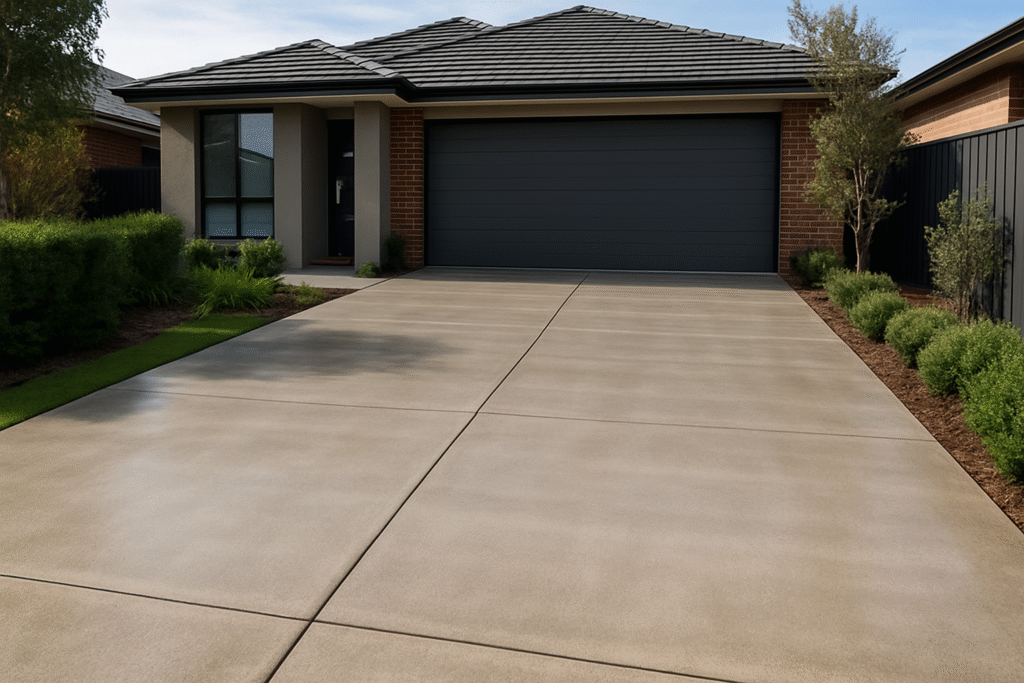Concrete is tough, reliable, and built to last — which is why it’s such a popular choice for driveways, patios, and outdoor entertaining areas across Geelong and Melbourne. But even the strongest concrete needs a little care. Without regular maintenance, surfaces can start to look tired, develop cracks, or lose their protective finish.
The good news? With the right cleaning, sealing, and inspection routine, you can keep your concrete looking fresh and performing well for years to come. Here are our expert concrete maintenance tips.

Understanding Your Concrete
Concrete is a mix of cement, water, and aggregates (like sand or gravel). Its durability makes it perfect for high-traffic areas, but exposure to weather, stains, and heavy use can wear it down over time. Knowing what your concrete is made of helps you choose the right cleaning and protection methods.
Regular Cleaning
Keeping your concrete clean prevents dirt, grime, and mould from taking hold. A quick clean every few months goes a long way.
How to clean concrete:
Sweep to remove leaves, dust, and loose debris
Wash with a mild detergent and water (avoid harsh acids)
Rinse thoroughly and allow the surface to dry
Tip: Use a pressure washer on a wide spray setting for stubborn marks, but avoid holding the nozzle too close to prevent damage.
Sealing Concrete Surfaces
Sealing is one of the best ways to protect your concrete against moisture, stains, and UV damage.
Acrylic sealers: Easy to apply, cost-effective, and provide a nice finish.
Epoxy or urethane sealers: Extra tough — ideal for driveways and commercial spaces.
We recommend resealing every 2–3 years, depending on how much traffic and weather exposure your surface gets. Always apply sealers on a clean, dry surface for best results.
Repairing Cracks and Damage
Hairline cracks are common and often harmless, but larger cracks can let in water and lead to more serious damage.
Small cracks: Fill with a quality patching compound.
Major cracks or lifting: Best to call in a concreting professional to assess and repair.
The sooner you act, the easier (and cheaper) the fix.
Preventing and Removing Stains
Concrete can stain if spills aren’t cleaned up quickly. Prevention is key, but if stains do occur:
Oil or grease: Use a commercial degreaser or absorbent powder like cat litter.
Rust: Apply a rust remover and scrub lightly.
Food and drink spills: Wash with warm water and detergent before they set in.
Weather and Seasonal Care
Cold regions: Avoid de-icing chemicals that can eat away at concrete. Use sand for grip instead.
Hot, sunny areas: Prolonged UV exposure can cause fading and small cracks. A UV-resistant sealer helps prevent this.
Coastal areas: Hose down occasionally to reduce salt build-up, which can weaken concrete over time.
Inspecting Your Concrete
Give your concrete a quick inspection every season:
Look for cracks, chips, or uneven areas
Check for water pooling after rain
Notice any colour fading or surface dullness
Early detection means easier maintenance and avoids costly repairs later.
When to Call the Professionals
DIY maintenance covers the basics, but for resurfacing, resealing, or major crack repairs, it’s best to bring in the experts.
At Pro Concreting, we provide professional concrete sealing, repairs, and resurfacing to extend the life of your surfaces. Whether it’s a driveway, patio, or commercial floor, our team has the experience to get it back to top shape.
FAQs
How often should concrete be sealed in Australia?
Most surfaces benefit from sealing every 2–3 years, but high-traffic driveways may need more frequent resealing.
Can I pressure wash my concrete?
Yes, but always use a wide spray setting and keep the nozzle at least 30 cm away to avoid damaging the surface.
What’s the best way to remove oil stains from concrete?
Apply a degreaser or use absorbent material like cat litter, then scrub with detergent and rinse well.
Does sealing concrete make it slippery?
Some sealers can increase slipperiness, but non-slip additives are available and highly recommended for outdoor areas.
Final Word
Concrete is built to last, but regular maintenance keeps it looking great and performing well. By cleaning, sealing, and inspecting your surfaces, you’ll extend their lifespan and protect your investment.
For professional help with sealing, repairs, or resurfacing, get in touch with Pro Concreting today — your local concreting experts.
